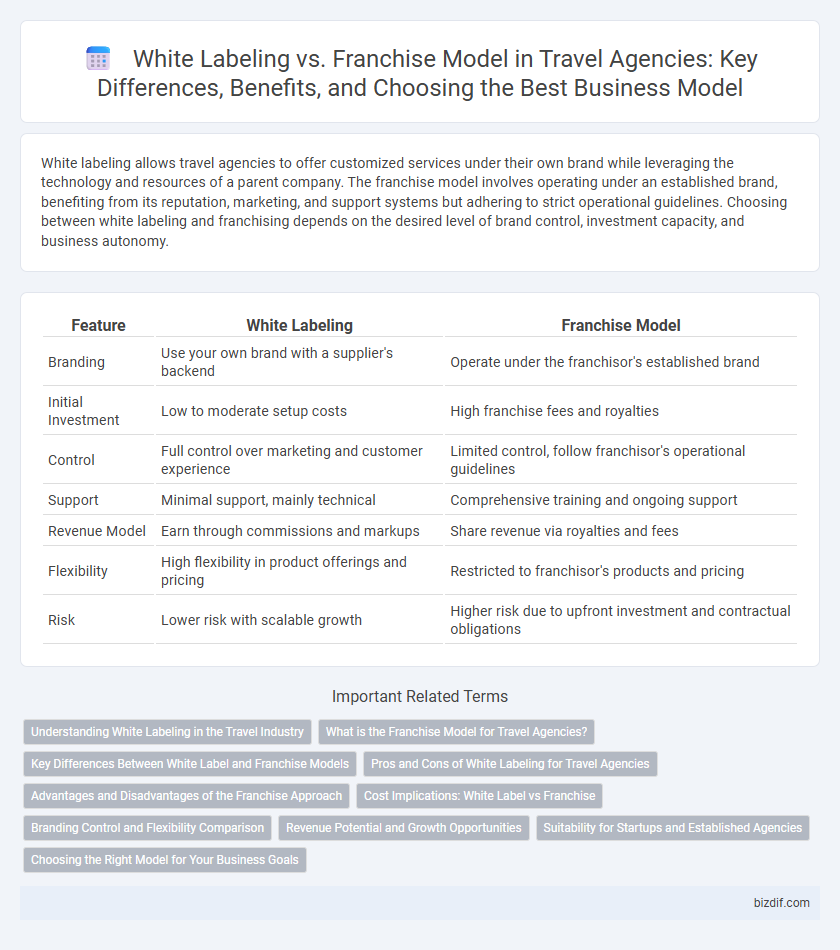White labeling allows travel agencies to offer customized services under their own brand while leveraging the technology and resources of a parent company. The franchise model involves operating under an established brand, benefiting from its reputation, marketing, and support systems but adhering to strict operational guidelines. Choosing between white labeling and franchising depends on the desired level of brand control, investment capacity, and business autonomy.
Table of Comparison
| Feature | White Labeling | Franchise Model |
|---|---|---|
| Branding | Use your own brand with a supplier's backend | Operate under the franchisor's established brand |
| Initial Investment | Low to moderate setup costs | High franchise fees and royalties |
| Control | Full control over marketing and customer experience | Limited control, follow franchisor's operational guidelines |
| Support | Minimal support, mainly technical | Comprehensive training and ongoing support |
| Revenue Model | Earn through commissions and markups | Share revenue via royalties and fees |
| Flexibility | High flexibility in product offerings and pricing | Restricted to franchisor's products and pricing |
| Risk | Lower risk with scalable growth | Higher risk due to upfront investment and contractual obligations |
Understanding White Labeling in the Travel Industry
White labeling in the travel industry allows agencies to offer customized travel products and services under their own brand while leveraging the infrastructure and inventory of established suppliers. This model enables travel companies to expand their product portfolio without investing heavily in technology or supplier relationships, enhancing operational efficiency and brand control. White labeling contrasts with the franchise model, where agencies operate under a shared brand and adhere to franchisor guidelines, limiting branding flexibility but providing established brand recognition.
What is the Franchise Model for Travel Agencies?
The franchise model for travel agencies involves a parent company granting independent agents the rights to operate under its established brand and business system. Franchisees benefit from access to proven marketing strategies, booking platforms, and supplier networks while adhering to the franchisor's operational standards. This model ensures brand consistency and support, enabling rapid expansion and increased market presence in the competitive travel industry.
Key Differences Between White Label and Franchise Models
White labeling in the travel industry allows agencies to offer services under their own brand while relying on a parent company's infrastructure, providing flexibility and lower startup costs. Franchise models require agencies to operate under the franchisor's brand, with standardized processes and support, often involving franchise fees and stricter operational control. Key differences include brand ownership, operational autonomy, initial investment, and ongoing royalties, with white labeling favoring customization and franchises emphasizing uniformity and established brand recognition.
Pros and Cons of White Labeling for Travel Agencies
White labeling offers travel agencies the advantage of branding a pre-built platform, enabling quick market entry without the need for extensive technological development or operational overhead. However, this model limits customization options and control over the product, potentially restricting unique customer experiences and differentiation from competitors. Dependence on the white label provider for updates and support can also pose risks if service quality declines or strategic priorities diverge.
Advantages and Disadvantages of the Franchise Approach
The franchise model offers rapid brand expansion and access to established brand recognition, which enhances customer trust and boosts sales potential for travel agencies. Franchisees benefit from comprehensive training, marketing support, and standardized operational procedures, though they face higher startup costs and ongoing royalty fees that reduce profit margins. However, franchisors maintain significant control over decisions, limiting franchisees' operational flexibility and innovation opportunities within the travel services market.
Cost Implications: White Label vs Franchise
White labeling in travel agencies requires lower upfront investment as it involves using an existing brand and infrastructure, reducing the costs of marketing and technology development. Franchise models demand higher initial fees and ongoing royalties, increasing operational expenses but providing brand recognition and comprehensive training support. White label options optimize budget allocation for agencies prioritizing cost efficiency, while franchises justify higher costs through established market presence and structured business frameworks.
Branding Control and Flexibility Comparison
White labeling offers travel agencies complete branding control, allowing custom logos, themes, and user experiences tailored to their target market. In contrast, franchise models impose strict brand guidelines, limiting flexibility but providing established brand recognition and marketing support. Agencies seeking adaptability and unique brand identity benefit from white labeling, while those prioritizing proven brand equity lean towards franchises.
Revenue Potential and Growth Opportunities
White labeling offers travel agencies the advantage of leveraging established brands while maintaining operational control, leading to higher profit margins and scalable revenue streams without hefty franchise fees. Franchise models provide strong brand recognition and structured support but often come with royalty payments and limited flexibility impacting long-term growth potential. Agencies prioritizing rapid expansion with lower upfront costs typically find white labeling more financially advantageous compared to the fixed fees and operational constraints of franchising.
Suitability for Startups and Established Agencies
White labeling offers startups rapid market entry with lower upfront costs and flexible branding options, ideal for agencies seeking scalable solutions without heavy investment. Franchise models suit established agencies aiming for brand consistency and support structures, benefiting from proven business systems and comprehensive training. Startups benefit from white labeling's agility, while mature agencies leverage franchising for stability and long-term growth.
Choosing the Right Model for Your Business Goals
Selecting between white labeling and a franchise model depends on your desired level of brand control and operational involvement in the travel agency industry. White labeling offers flexibility by allowing you to market established travel services under your own brand, minimizing management responsibilities. The franchise model demands adherence to a proven system with higher control over customer experience, ideal for businesses seeking brand recognition and comprehensive support.
White Labeling vs Franchise Model Infographic

 bizdif.com
bizdif.com